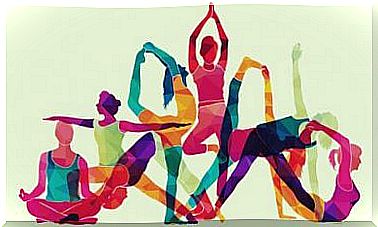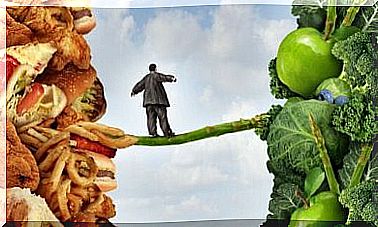The Fire Of Anger Consumes Us But It Also Burns Others

We have all lived through situations that annoyed us so much that we felt anger rising in us without being able to remedy it. Who has never noticed that a simple spark could ignite a fire that would spread throughout our being? The worst part being that this uncontrollable rage made us say and do things that we deeply regretted afterwards.
The point is, we don’t just feel bad for ourselves, but also for those around us. It appears that very often we hurt the people we love. This happens even when they have nothing to do with the cause of our anger. In fact, many take our anger head on as they try to calm it down.
“Anger is like fire: you can only extinguish it at the first spark. Afterwards, it’s too late. “
-Giovanni Papini-
What is anger and what repercussions does it have on the person feeling it?
Let’s start from the beginning: what is anger? It is an emotion that produces unpleasant feelings in the one who feels it. The body shifts from a state of tranquility to a state of great activation to respond by defending or attacking.
We feel it mostly in interpersonal situations, that is, when we bond with other people. If in any of these situations we feel that our pursuit of a goal is being blocked unjustifiably and intentionally, anger arises.

At this precise moment, we feel that our interests are threatened and that we must act to defend them. The point is, anger usually starts at relatively low levels of unease. But if we don’t deal effectively with this initial irritation, it can continue to increase until it explodes.
Having a high tendency to respond with anger to different conditions has been shown to significantly affect health. In the first place, it generates a set of unpleasant sensations for the one who feels it. But it’s not just that: it’s also an indicator of the presence of affective disorders like depression.
In addition, it is a variable that must be taken into account in the treatment and rehabilitation of various neuropsychological disorders, such as those associated with traumatic brain injury or alcoholism, as demonstrated by a study of the Camilo José Cela University. On the other hand, it influences various physical problems. Examples are cardiovascular disorders, cancer, ulcers, smoking, etc.
When I act while being overcome by anger, how do those around me perceive it?
Anger not only affects our own physical and mental health, it also affects those around us. Let’s put ourselves in the shoes of our loved ones: How did it feel when someone got angry and projected their anger on us?
The answer may vary depending on a variety of circumstances. Whether we are really the “guilty” of that person’s anger or not; the strategies she used to let us know; if she has acted in a rather calm manner or if, on the contrary, she has developed extremely aggressive behavior towards us. These points, among others, will influence our interpretations of the situation and, consequently, the emotions that will appear.

Starting from this basis, keep in mind that the more uncontrollable the anger and the more aggressive the provoked behaviors, the more the other will feel attacked. He will eventually get angry as well and have a hard time controlling himself. And we can all imagine the outcome of this situation, can’t we? Who hasn’t had an argument with someone else for a reason the two of them deemed stupid but still ended in battle with serious injuries?
This type of situation can generate a considerable number of negative emotions in the other. Starting with sadness, anger, incomprehension or vulnerability. It can also lead to feelings of rejection from the person who reacted like this with us. In fact, if we act by constantly getting angry with others, it is possible that they will drift further and further apart and we may find ourselves isolated.
“A person who wants revenge keeps his wounds open. “
-Sir Francis Bacon-
Is there a relationship between the way I am and the anger I feel?
Anger, besides being an emotion, can be seen as a stable tendency to react with rage during different situations. It can be part of our way of being. This means that there are people whose way of being is more filled with anger than that of others. These individuals respond with higher levels of anger to different circumstances and with greater activation of the body.
We see similarities with people who have a low predisposition to irritability in relation to the type of situation that makes them angry. However, the differences lie in the fact that they react more intensely and more frequently with anger in their daily life when faced with conditions that bother them.

Certain personality characteristics have been shown to have an impact on the process of the onset of anger:
- Hostility. Hostile people exhibit negative attitudes towards others, having a greater tendency to display anger and respond with aggressive behavior, with the aim of harming others.
- Extroversion. Introverted people report feeling more anger than extroverted people.
- Neuroticism. This concept refers to the emotional instability that people may experience. Those people with greater neuroticism experience feelings of anger more. They also have a greater tendency to respond aggressively.
- Self-esteem and narcissism. Individuals who have higher self-esteem, combined with a narcissistic personality, are more likely to respond in an irascible manner. In addition, they are less in control of themselves when it comes to expressing this emotion.
As we have seen, constant anger has a lot of negative impacts on our life. It is therefore important to control it when the first spark appears because once the fire has spread, it will be more difficult to extinguish it.
On the other hand, once it is gone and we lower our activation level, a whole range of negative emotions can arise. We then realize the consequences of our behavior as well as the harm we may have inflicted on the beings we love. Consider that if you face anger when you are still a child, if you don’t let it mix with ego or pride, you won’t have to heal great deep wounds.









